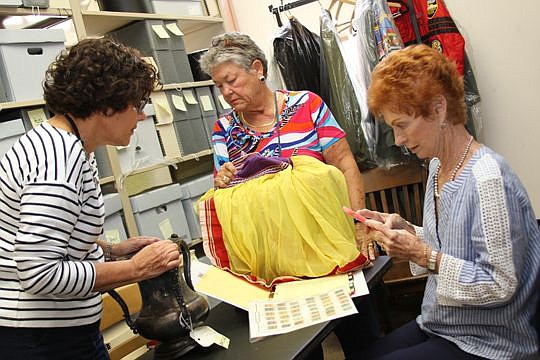
In 1941, a fire raged at Jacksonville’s Clyde-Mallory Steamship dock.
A young woman on the scene grabbed her camera, snapped pictures and then stored them away for decades.
Now elderly, the woman was organizing her estate recently when she came across the images.
She called Jacksonville Historical Society archivist Taryn Rodriguez-Boette and asked if she would like to have them.
“Of course,” said Rodriguez-Boette, who organizes and catalogs photographs, artifacts, books and papers pertaining to the city’s past, with the help of many volunteers.
“We are able to document everything in Jacksonville because people remember to call the Jacksonville Historical Society,” she said. “We take a lot of stuff. It’s amazing what people save.”
Rodriguez-Boette joined the Historical Society in October 2014, shortly after it moved into the Old St. Luke’s Hospital building on Palmetto Street.
She brought with her years of experience at the St. Augustine and the Beaches Area historical societies.
“The timing was perfect” to bring her aboard in Jacksonville, said Executive Director Emily Lisska.
The Historical Society’s archives collection had been stored in various places throughout the city for years, and for the first time, everything was in one location and in dire need of organizing.
Rodriguez-Boette was up to the challenge.
When she arrived “everything was mixed up in boxes,” she said.
It was difficult to even know where to start because the collection was so large.
Now, under her supervision, everything has been categorized according to media: paper, books, maps, newspapers, artifacts, photography and framed art.
The building lent itself to the task. It served as a hospital from 1878-1914 and had originally been designed with a central nursing station fanning off to patient ward rooms on the first and second floors.
Those rooms now house various collections, as well as offices.
The Artifact Room contains unique and historic items, including signs, vintage clothing and trophies.
The Reading Room has shelves of books about Jacksonville and Florida history. It is open to the public for research.
In the upstairs and downstairs hallways, small exhibits highlight Jacksonville’s history.
Currently on display is “Missing Downtown,” which includes artifacts and photos of once-popular businesses, such as Worman’s Bakery and the Mayflower Hotel.
Other rooms house maps, blueprints, brochures and various collections of photographs, including one from G.M. Chapin, a professional photographer from the 1910s and 1920s, and 4,000 glass negatives from photographer Leah Mary Cox, who documented city life from the 1880s through the 1930s.
“The volunteers help with research and they help organize materials so they are retrievable,” Rodriguez-Boette said. “The goal is to get all the collections organized.”
Many of the society’s 19 volunteers, who range in age from 15 to 85, worked with Rodriguez-Boette at the Beaches Museum & History Park in Jacksonville Beach, where she organized the Beaches Area Historical Society’s archives, library and collection of 20,000 photographs.
They enjoyed working with her so much they now carpool to Downtown.
At the Jacksonville Historical Society, Rodriguez-Boette works three days a week and also is assistant director.
The volunteer corps is organized around her schedule, with morning and afternoon crews.
She also has a paid staff assistant and office manager, Meghan Powell, a recent college graduate with a degree in history.
“This is a very interesting place,” Rodriguez Boette said. “It’s very much alive.”
In addition to the organization’s longtime collections, she said they get new donations every week, along with 20 to 25 requests for information.
Some people inquire about where a business was once located. Others, who are researching their families, are looking for records. Some are looking for photographs of a particular subject.
The extensive photo collection is in the process of being digitalized and put on the website.
Rodriguez-Boette, who grew up in Puerto Rico and is bilingual, said her job suits her personality.
“Archivists have a way of thinking that is very structured and very categorical,” she said. “I see things in categories.”
She said she has always been that way, even as a child, when she organized the dolls and books on her bookshelves according to type and the clothes in her closets according to color and occasion.
“Because I think in categories, my job is very fulfilling,” she said. “It’s very fulfilling to be able to take a box full of stuff — papers, photos, scrapbooks and be able to categorize it so everything is usable.”
Lisska says Rodriguez-Boette “is a pro.”
“The collections here are so numerous and varied, there is hardly a local history subject matter we don’t touch,” Lisska said. “Among her accomplishments are the increased numbers of collections that have been fully processed.”